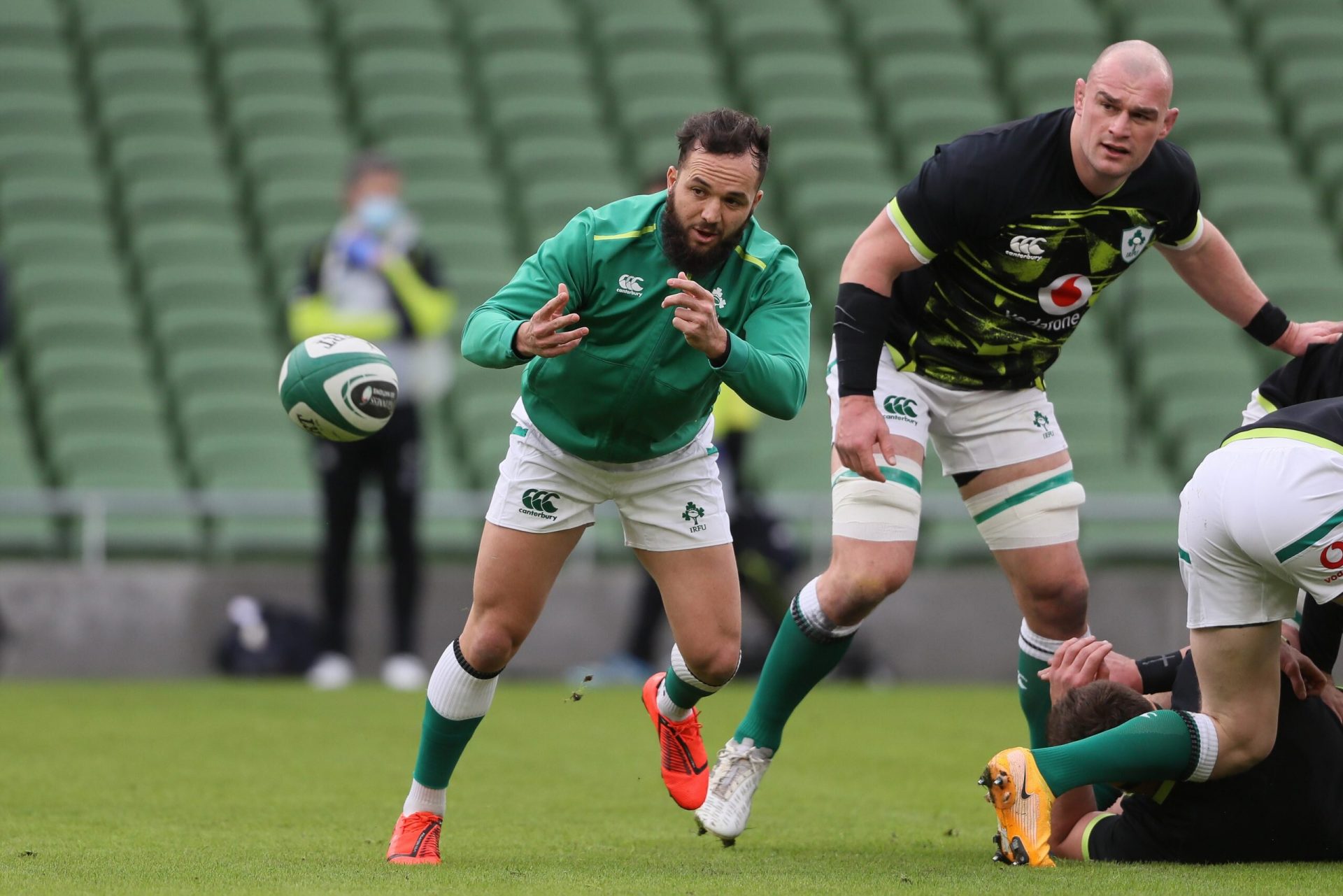Ref Watch: Scottish reds, Welsh elbows, English cheap shots, Irish cynicism and why Jonny May's leap was legal

Ref watch: For a second consecutive weekend a sending off dominated Six Nations headlines as Scotland’s Zander Fagerson followed Ireland’s Peter O’Mahony in seeing red.
These incidents – plus a number of others over the opening two rounds of action – have also shone a spotlight on rugby’s recent crackdown on contact with the head.
From “the game’s gone soft – it’s a contact sport what do you expect?” at one extreme, to those who believe every possible step must be taken to avoid head injury at the other it’s fair to say this situation polarises opinion.
And against the horrific backdrop provided by the early-onset dementia being suffered by Mike Lipman, Steve Thompson and the 40-something former professionals, the debate is both heated and emotional.
English officials Wayne Barnes and Matthew Carley have been the two men required to brandish red cards – and while neither will have relished the experience both followed protocols to the letter.
This requires the officials to first establish whether contact is directly to the head, then assess how forceful it is and whether there mitigating circumstances exist perhaps due to a late change in body position or a player stumbling into contact.
It is this last consideration which is crucial in the Fagerson case – and had Carley and TMO Karl Dickson used the available evidence to reduce red to yellow I suspect there would have been few complaints.
The most significant change brought about by the current crackdown is that officials are no longer required to factor intent into their thinking. This means that O’Mahony’s deliberate elbow to the face and Fagerson’s reckless-but-unintentional shoulder-to-head contact are now treated as equal crimes. This is very different to the approach taken through the vast majority of rugby union’s history.
Assuming the two contacts were of equal force, the outcome for the recipients is likely to be similar – but is outcome a good yardstick on which to base such critical decisions on the biggest of rugby stages? It is hard not to agree with the view that this laudable attempt to improve safety is also fundamentally altering some of rugby’s basics.
| Quarter 1 | Quarter 2 | Quarter 3 | Quarter 4 | |
| Pens against Scotland | 3 | 3 | 5 | 0 |
| Pens against Wales | 3 | 2 | 5 | 3 |
Unlike law changes introduced to stop dangerous contact with players in the air – which most notably saw England’s Elliot Daly red-carded a few minutes into an Autumn International against Argentina – these new interpretations are yet to have the desired effect. In time this may change, but if it doesn’t, given the sensitive nature of what they are trying to achieve, it will be a brave man who calls for a rethink.
In similar vein, Saturday’s games also saw a Liam Williams elbow lead into James Lang’s face and Owen Farrell’s late tackle on Italy’s Stephen Varney go unpunished. Both involved contact with an opponent’s head.

The Williams incident which happened at high speed was not picked up by the on-field officials. It was highlighted by the BBC coverage post-match as a possible yellow card offence, and under current interpretations it is hard to disagree with this assessment based on the evidence. But again…was there intent or was it a slightly mistimed fend off?
Farrell’s late challenge, which began at chest height and ended with head contact, was at best “a rugby collision” and at worst a cheap shot. This one was picked up by the officials who found in the England skipper’s favour – although it seems to me intent was present and his actions were more culpable than those of Williams.
| Quarter 1 | Quarter 2 | Quarter 3 | Quarter 4 | |
| Pens against England | 3 | 2 | 3 | 4 |
| Pens against Italy | 3 | 3 | 2 | 3 |
Away from head-related incidents, social media has questioned the legality of England winger Jonny May’s spectacular finish – which Nigel Owens’ Mail on Sunday column also adjudged illegal.
For those who are yet to view the incident, in an incredible piece of athleticism, May launched himself over a last-gasp Italian tackle to ground the ball while in mid-air contact with the corner flag (which is now in play rather than in touch).

In years gone by, jumping into a tackle was expressly forbidden by the law book. Various rewrites have seen this disappear, with officials now required to assess all actions against law 9.11 “Players must not do anything that is reckless or dangerous to others.”
Decision making in rugby is often not black and white, and I am going to have to disagree with the great Mr Owens on this one. Had May’s leap taken him towards a defender it would be in the dangerous category, but since he launched himself into space slightly to the defender’s right in my judgement it was both brilliantly executed and legal. Applying consistent logic, in this situation a defender therefore has to be permitted to tackle the ball carrier in mid-air – provided he is brought safely to ground.
My time working at Wasps included the 2018 Premiership semi-final when Jack Willis ruptured an ACL, so I was doubly sorry to see him suffer another serious-looking knee injury on Saturday and relieved when it subsequently emerged he has not suffered a repeat.
Somewhat hopeful news coming out of Wasps' camp this evening – report The Coventry Telegraphhttps://t.co/2IsHZWVJW6
— RugbyPass (@RugbyPass) February 14, 2021
Post-match TV analysis concentrated on Sebastian Negri’s ‘crocodile roll’ and the potential for legislation being introduced to combat this clear-out manoeuvre. In fact, stricter use of existing law would suffice – since laws 15.3 and 16.7 explicitly require players involved in a maul/ruck to “have their heads and shoulders no lower than their hips.”
| Quarter 1 | Quarter 2 | Quarter 3 | Quarter 4 | |
| Pens against Ireland | 1 | 2 | 1 | 1 |
| Pens against France | 4 | 2 | 1 | 2 |
The best refereeing performance of the weekend unquestionably was in Dublin where English official Luke Pearce oversaw France’s narrow win against Ireland.
Pearce’s management was outstanding throughout and there is no question that his ability to converse in basic French really helped.
Communication benefits are only one aspect of this. Equally significant is that his efforts maintain a level playing field for both sides immediately removes an psychological barrier between the official and the non-English speaking side.
Pearce’s undemonstrative approach was perfectly suited to this match. A good example came at the end of the opening quarter when he quietly warned Ireland’s Jamison Gibson-Park about “trying to milk a penalty” by pretending to trip over French bodies on the wrong side.

Another referee on another day would have fallen for these theatrics – and handed Ireland three dubious points. Equally, under a different whistler the game could have stopped while a long lecture was delivered on the spirit of the game. Instead Pearce’s quiet word stopped Gibson-Park’s gamesmanship in its tracks while simultaneously sending a clear message to all the other players.
My only (minor) criticism of the English official’s performance came as early as the second minute when he adjudged Gabin Villiere’s knock down of a pass destined for an in-space Keith Earls worthy of only a scrum.
A misconception has developed in recent times – perhaps due to some less-than-accurate TV punditry – that a deliberate knock on should usually (or even always) result in the award of a yellow card. In reality, each incident has to be judged on its merits, so in the same way killing the ball or being deliberately offside may earn the offender a card on some occasions, on others a penalty suffices and to my eyes this was one of those.


















































